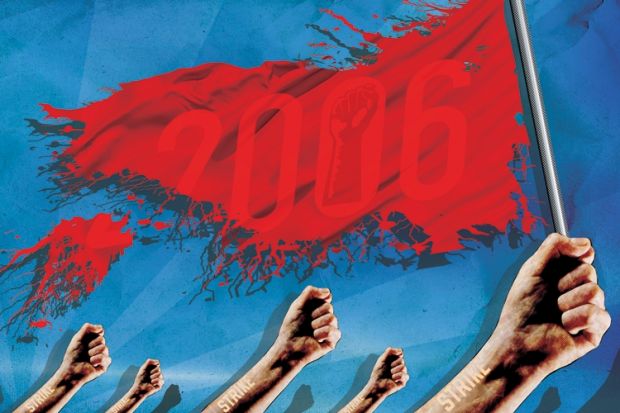Source: Paul Bateman
Institutions have policies to withhold pay in full for partial performance now. There is clear legal backing for an employer taking such a position
The national pay negotiations for 2013-14 concluded last summer, but the repercussions of the failure to reach agreement remain with us.
While four of the five trade unions involved in higher education decided to take industrial action after the conclusion of the talks, less than 5 per cent of staff joined the strikes, and numbers waned across the three days of joint strikes and the additional two-hour University and College Union strikes that took place earlier this year.
Thankfully, this meant that there was minimal disruption at most institutions.
During the past few years of pay restraint and austerity, progression pay, merit pay and the annual uplift have kept average higher education pay increases at about 3 per cent.
Although it may not have felt like it, these rises maintained the national position of higher education pay relative to other professions and industries. However, those not receiving progression or merit rises have seen their salaries decline in real terms.
Higher education staff in the UK excel on most measures and make our sector a major national and international success story. But the success is delicate, and the proposed assessment boycott, which is due to take place from 6 May unless an agreement is achieved, has the potential to cause damage. With discussions and consultations taking place as Times Higher Education went to press, I still hope that constructive exploratory talks and the very positive opening to the 2014-15 pay negotiations will enable the UCU and the Educational Institute of Scotland to reconsider their plans. In the meantime, regrettably, universities have to prepare for the worst.
A real concern is that some colleagues may believe that an assessment boycott will be as successful as it was in 2006 and lead to an increase on last year’s pay uplift.
In reality, 2006 and 2014 are worlds apart.
In 2006, pay restraint and austerity were alien. The UK economy had grown by 11 per cent in three years, and we had become used to the good times. Undergraduate tuition fees of up to £3,000 a year represented additional income for universities and formed part of the Labour government’s expansion of higher education.
By comparison, funding reductions since 2008 have been severe, with an 80 per cent cut to the teaching grant in England. This has been replaced by a regime of uncertain income secured in England through a capped £9,000 undergraduate fee. Capital funding has all but disappeared, and future national insurance, pension and other costs loom large in institutional thinking.
The 2006 pay dispute was bitter. The Association of University Teachers and the National Association of Teachers in Further and Higher Education (which merged to form the UCU) sought a 23 per cent increase over three years and announced an assessment boycott well in advance of negotiations.
Support was sustained during the action because it proved a relatively easy tactic to deploy, with little or no repercussions for those taking part. It ended at the 11th hour, just before most students were affected seriously.
Although a significant settlement was always likely, the tactic resulted in one of the largest higher education pay increases in recent times. In 2006 an assessment boycott was new, and institutions responded in different ways. Most chose to defer a decision to withhold pay, while some withheld pay with full repayment after the action ended. As a consequence, the pressure on institutions was sustained successfully for nearly five months, and there are few who doubt that the action played a significant part in the ending of the dispute.
None of this would happen in 2014.
All institutions are clear that last year’s average pay increases of about 3 per cent were at the limits of affordability. Unlike 2006, there is no new funding stream. Far from it, universities will be struggling to assess what will be affordable and sustainable increases to the overall 2014-15 pay bill while wanting to offer the best uplift they can, in their individual circumstances.
These same institutions now have policies to withhold pay in full for partial performance with no suggestion of repayment once the action ends. They now know that there is clear legal backing for an employer taking such a position. Also, students are now acutely aware of their role as “purchasers” of higher education and will expect institutions to take all reasonable steps to provide it.
Attempting to minimise the impact of an assessment boycott by withholding full pay for such serious partial performance is one such reasonable step.
As in 2006, staff are reluctant to take action that would harm their students, and institutions certainly do not wish to position themselves between staff and students.
I know that institutions have struggled with the question of how to respond if this action goes ahead. However, withholding full pay is the only protection our institutions have left to offer students in the face of potential harm to them, our institutions and indeed the sector.
Needless to say, we all still hope that a solution can be found that is acceptable to all parties.
Register to continue
Why register?
- Registration is free and only takes a moment
- Once registered, you can read 3 articles a month
- Sign up for our newsletter
Subscribe
Or subscribe for unlimited access to:
- Unlimited access to news, views, insights & reviews
- Digital editions
- Digital access to THE’s university and college rankings analysis
Already registered or a current subscriber? Login





